So while I am *busily* working on gathering material from the Cooperator's Meeting for the blog, I thought I'd throw up a few photos from the barn dance last night.
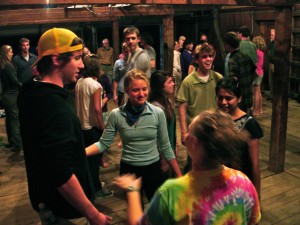
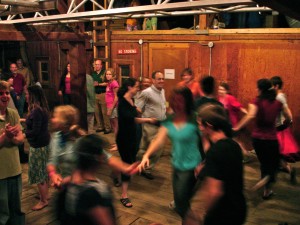
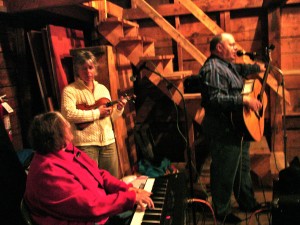
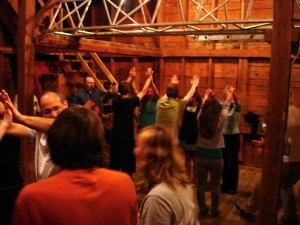
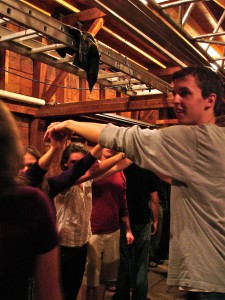
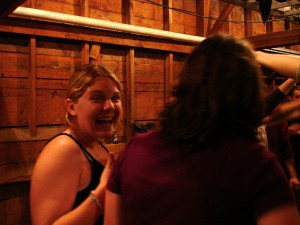
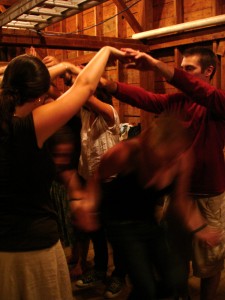
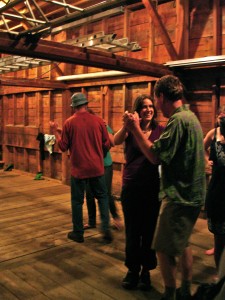
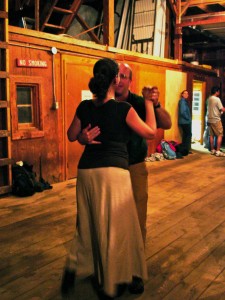
Tada!
Posted in Summer 2009, Uncategorized on July 8, 2009 |
So while I am *busily* working on gathering material from the Cooperator's Meeting for the blog, I thought I'd throw up a few photos from the barn dance last night.









Tada!
Posted in Summer 2009, Uncategorized on July 8, 2009 |
Dr. James Collins is the Director of the Directorate for Biological Sciences at the National Science Foundation. Additionally he is a Virginia M. Ullman Professor of Natural History and the Environment in the School of Life Science at Arizona State University.
Essentially, he is very important.
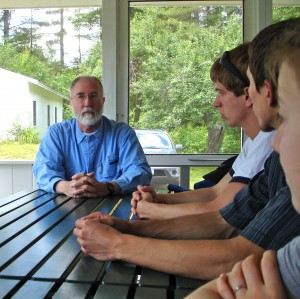
He is visiting Hubbard Brook this week as the keynote speaker for the 2009 Cooperators Meeting, and spoke to the REU students Monday afternoon.
His talk included how he got interested in science, his work in biology, how the NSF works, and the future of careers in biology among other topics.
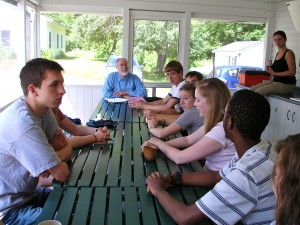
Personally, I thought it was great that Dr. Collin's took so much interest in what we as students are working on, and how we perceive the research world. The session was much more of a conversation than a lecture.
For audio from his talk, please click here: http://tiny.cc/JamesCollinsTalk
Did you always want to be a scientist? (And, why biology?)
While he was always interested in the natural world. Dr. Collin's initially wanted to be a pet store owner when he was younger (we're talking elementary school). Later on, his more realistic ideas included becoming either a pediatrician or something else in the field of biology. After working as a part of a research team in the Bahamas, he decided to pursue a career in research science.
What are some of your current projects?
His current work includes the biology and ecology of infectious diseases, diseases and wildlife, and how diseases can cause species extinction. Most of his work is conducted using amphibians (mainly salamanders), and studying the decline of organisms such as bats (via white nose syndrome) and chestnuts in the Eastern United States.
Additionally, he is busy working as the Director of the Biology programs at the National Science Foundation, and in his *spare* time he has just completed a book titled "Extinction in Our Times; Global Amphibian Decline". It can be found at the address below:
http://tiny.cc/ExtinctionInOurTime
Do you have any advice for aspiring young undergraduate scientists like us?

Posted in Summer 2009, Uncategorized on July 6, 2009 |
It sounds utterly unamazing, but the name doesn't give it credit.
The annual Cooperator's Meeting will occur at Hubbard Brook this week. The meeting is essentially a large conference for all of the scientists working at Hubbard Brook. It consists of short presentations about current scientific work, poster sessions, board meetings, and of course, the dinner and barn dance!
The scientific presentations are broken down into several categories, including heterotrophs (animals), hydrology (water movement), biogeochemisty, vegetation, and special work in Watershed One and calcium levels. Scientists will be coming from Cornell University, Syracuse University, SUNY ESF, the University of New Hampshire, UC Berkley, the University of Vermont, and Dartmouth College among others.
For more info, check out:
http://www.hubbardbrook.org/events/coop_meetings/09agenda.pdf
And it all is a whole lot cooler than it sounds.
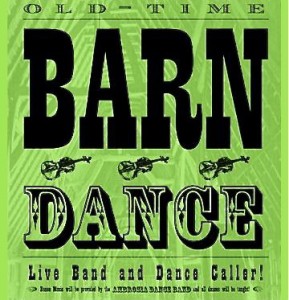
Posted in Summer 2009, Uncategorized on July 3, 2009 |
Have a great 4th of July everyone! Next post will be on Monday, about the upcoming Cooperator's Meeting.
Posted in Uncategorized on July 1, 2009 |

Major/Home University: Wildlife Biology, University of Vermont
Project Mentor: Dr. Gene Likens
Why/how did you get involved with the program?
Kaitlin applied to the Cary Institute because it was "perfect" in every regard: there were ecological projects, it provided summer work, was interesting, and could expanded into a senior thesis. She was in contact with Dr. Gene Likens before the Cary program started, and became enthused about the project based on conversations she had with him.
What is your project?
"The Relationship Between Headwater Chemistry and Salamander Abundance"

Basically, she is seeing if there is a relationship between salamander abundance and the chemical variations that occur naturally in these systems during the summer wetting and drying period. Or even better put, if the amount of salamanders in an area depends on the quality of water there.
Why is it important?
This work could further our understanding of stream salamander distribution. Also, on a broader scale, it helps us understand how changes in water chemistry effect the ecosystem as a whole. A tiny increase in pH, for instance, could have large implications for plants and animals. Right now, we're just not sure.
And finally....what is your favorite piece of gear?
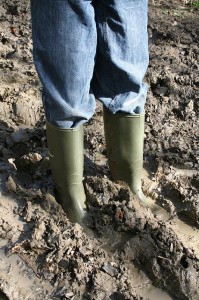
Mud Boots- Because they keep her feet dry, and there is nothing as wonderful as dry feet when you're in the field.